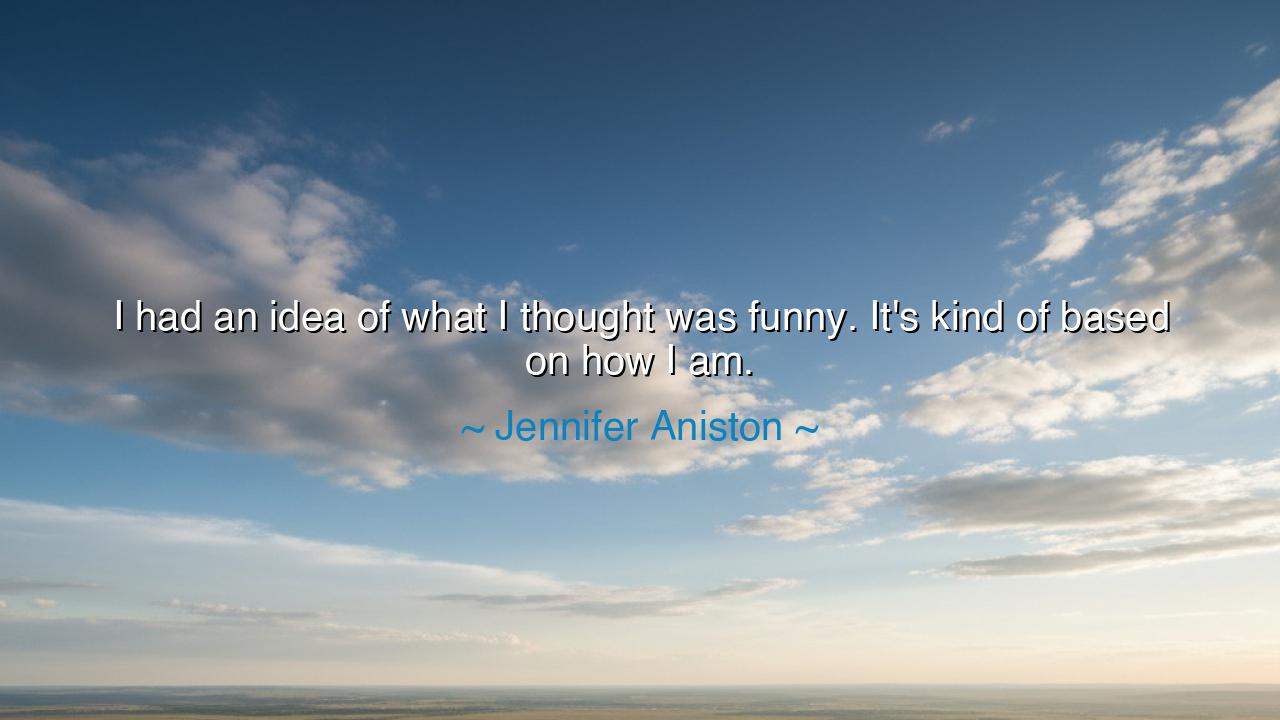
I had an idea of what I thought was funny. It's kind of based on






In the words of Jennifer Aniston, “I had an idea of what I thought was funny. It's kind of based on how I am.” — there is a quiet but profound revelation about authenticity, self-expression, and the eternal bond between the artist and her truth. Though the words seem simple, they carry the weight of an artist’s awakening — the moment one realizes that the greatest art springs not from imitation, but from the essence of one’s being. In these few lines, Aniston reminds us that the truest form of humor, creativity, and beauty comes not from seeking approval, but from the courage to be oneself — unmasked, unfiltered, and alive.
The meaning of this quote lies in its embrace of self-knowledge. To say, “what I thought was funny,” is to acknowledge that laughter — like art, like love — is deeply personal. It cannot be faked, for false laughter rings hollow. Aniston, whose gift for comedy has charmed millions, reveals that her sense of humor was never constructed for others — it grew naturally from her way of being, her rhythm, her heart. This is a teaching that transcends the world of entertainment: that our truest creations emerge when we stop trying to perform for the world and instead express the truth of who we are.
The ancients understood this sacred principle. Socrates urged his followers to “Know thyself,” for only through self-knowledge could one live wisely and well. In the same spirit, Aniston’s words echo this timeless wisdom — to find one’s voice, one must first know one’s soul. Just as the philosopher searched for truth within, the artist searches for her authentic tone, her natural humor, her instinctive spark. The world is full of noise and imitation; yet only the voice that is true — born of self-awareness — has the power to move hearts and endure across time.
Consider the story of Lucille Ball, the great pioneer of comedy, who, like Aniston, turned her natural quirks into timeless art. Lucille once said that she was not naturally funny — she simply knew how to be honest in a funny situation. Her brilliance lay not in performing someone else’s vision of humor, but in trusting her own instincts — her awkwardness, her expressions, her spontaneity. What audiences found hilarious was not an act, but authenticity. This is the essence of what Aniston describes: that real humor flows from self-honesty, not from artifice. The one who dares to be themselves invites others to laugh not at a mask, but at the shared humanity beneath it.
The origin of Aniston’s insight can be found in her journey as an artist. Before she became a household name, she faced countless rejections and uncertainties. The world of acting, like life itself, constantly tempts one to conform — to fit into molds, to please the expectations of others. But true creative freedom begins when one stops chasing the world’s laughter and starts listening to one’s own. When Aniston embraced her own voice — her dry wit, her warmth, her grounded humor — she found not only success, but peace. In doing so, she joined a lineage of artists who discovered that self-expression is not about invention, but revelation.
The lesson for us all is clear: the greatest power we possess is the courage to be genuine. Whether in art, work, or daily life, we are often drawn to mimic what others find valuable — the trend, the image, the tone. But as Aniston teaches, what is truly funny, beautiful, or meaningful must come from within. To know yourself — your joys, your quirks, your flaws — is to possess the raw material of greatness. The world will always crave authenticity, for it is the rarest thing in existence.
Therefore, my friends, let this wisdom take root in your heart: do not chase the laughter of others before you have found your own. Be patient enough to understand what moves you — what stirs your soul, what awakens your humor, what lights your mind with fire. For when your expression flows from who you are, it will never fade, nor will it fail to touch others. The greatest art, the deepest joy, is born from self-truth, not performance.
And so, as Jennifer Aniston reminds us, to be funny — or creative, or wise — is not to construct an image, but to live as oneself fully. The artist’s laughter, like the philosopher’s wisdom, is the sound of the soul made visible. Trust your essence. Live as you are. For in that honesty lies not only humor, but harmony — the eternal music of the self meeting the world without disguise.






AAdministratorAdministrator
Welcome, honored guests. Please leave a comment, we will respond soon